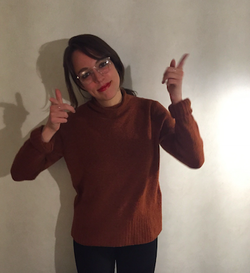
Hi, I'm Becca. I am the non-fiction book critic of the Washington Post, an editor at The Point, and a contributing editor at The Boston Review . My essay collection, All Things Are Too Small, was published Metropolitan Books in the US and Virago in the UK in April 2024. The New York Times called it "splendidly immodest" and "exhilarating" and The Guardian called it "bracing and brilliant." It was a New York Times editors' pick and a New Yorker weekly recommendation. Finally, I am also a PhD candidate (on indefinite hiatus) in philosophy at Harvard, but i remain perhaps delusionally convinced that someday I will finish my dissertation. These days I live in Washington, DC, with this person, whom I love. Here you can find all of my Washington Post pieces, which will come out each week, generally speaking.
To keep up with my writing/rantings, subscribe to my substack here. As a writer: I have contributed essays, book reviews, and the occasional art review to publications like The TLS, The Nation, The New York Times Book Review, The New Yorker, The Atlantic, Liberties, Bookforum, Art in America, The Yale Review, The Baffler, and more. These days, I write mostly for the Washington Post about non-fiction, but occasionally I write essays on fiction and whatever else for other venues. I am the winner of the first annual Robert B. Silvers Prize for Literary Criticism (see more here) and the 2023 Nona Balakian Citation for Excellence in Reviewing (see more here). In 2017, I was a finalist for a National Magazine Award in the essays/criticism category. A few authors I especially love are Joseph Roth, Italo Svevo, Henry James, Henry Green, Heinrich von Kleist, Marie de France, and Norman Rush. My agent is Anna Sproul-Latimer of Neon Literary. As a (lapsed?) philosopher: I am primarily interested in aesthetics (especially aesthetic value and its relationship to other types of value), the philosophy of love and sex, and the history of German philosophy, especially Martin Heidegger, although I have increasingly consuming secondary interests in political philosophy. In "The Good, the Bad, and the Ugly," published in The British Journal of Aesthetics, I defend aestheticism, the view that aesthetic value is sometimes a partial grounds of moral value. I describe aestheticism in more detail in a chapter in the Oxford Handbook of Ethics and Art. If I ever get around to completing it, my dissertation will be about some combination of the following: what it is to be a beautiful person, why evolutionary psychologists are wrong about human beauty, the ethics of exclusionary romantic/sexual/aesthetic preferences, and what role the state should play in ameliorating inequitable distributions of intimate "goods." I hold a first-class MPhil in the history and philosophy of science from the University of Cambridge and a B.A., summa cum laude with high honors, from Dartmouth College, where I studied philosophy & German (and cultivated an enduring distaste for fraternities). I receive many emails asking for advice about graduate school applications. I have answered some frequently asked questions on this page. As I note there, I do not consider myself an expert in how to write a successful graduate school application, and I urge all prospective grad students to consult resources online, as well as supervisors who have served on admissions committees, rather than me! Before the pandemic, I followed Hegel in regarding nature as geistlos, but now, like any good Heideggerian, I am a big fan of hiking. Here I am in the Berkshires, which I love
|
|
The Irish novelist Sally Rooney is a normal person. Or so she is always insisting, often with a trace of defensive desperation. Never mind that she published her debut novel, Conversations with Friends (2017), at the tender age of 26, or that her second novel, Normal People (2018), was long-listed for the Man Booker Prize. Never mind that she is the youngest-ever recipient of the Costa Book Prize. No, Rooney protests, her many accolades and immense popularity notwithstanding, she is just like everyone else. Here she is in Vanity Fair: “I do think it’s very possible I’ll look back on this period of my life when my books were being talked about on Twitter and think, ‘Wow, what a crazy thing to happen to a just totally average person.’” And in O, The Oprah Magazine: “I feel pretty much like everyone else.” And in the Belfast-based literary journal the Tangerine: “Everyone has a life. I haven’t had a particularly interesting one.”
Of course, genuinely normal people do not have the chance to advertise their normalcy in Vanity Fair or Oprah’s magazine. Would Rooney still be so eager to downplay her achievements if there were any risk that she would actually succeed in deflecting attention? I have to say, I hope not. Read more here.
3 Comments
Tom
5/4/2020 09:44:37 pm
I found this review for The Point after twitter exploded over the infamous Cory-Wright review of Normal People. I found your review to be very engaging. It's hard to critique really popular media when so often the criticism is deflected by broader discussions that move the conversation far away from the text itself. Particularly if said media is progressive and written by a woman. Most people seem ill-disposed to believe any criticism is being made in good faith. However I found this sound and entertaining without being needlessly mean spirited. From there I went on to read your your Baffler article on 'immoral men' and found it equally captivating and confronting. Fantastic stuff. I look forward to reading more of your work in the future. Good luck with the rest of your PHD!
Reply
Becca
5/5/2020 06:56:47 pm
Thank you very much!
Reply
Brian
8/12/2020 07:14:40 am
I enjoyed this review enormously. Very perceptive. I got here by googling "Sally Rooney 50 shades". As I read Normal People recently I was struck by how much of it chimes with both Twilight and 50 Shades in a lot of places. That thought hadn't occurred to me when I read Conversation with Friends a couple of years ago but it's interesting to see how much of that story plays on similar themes once it's laid out in your essay.
Reply
Leave a Reply. |
Archives
June 2022
Categories |

 RSS Feed
RSS Feed